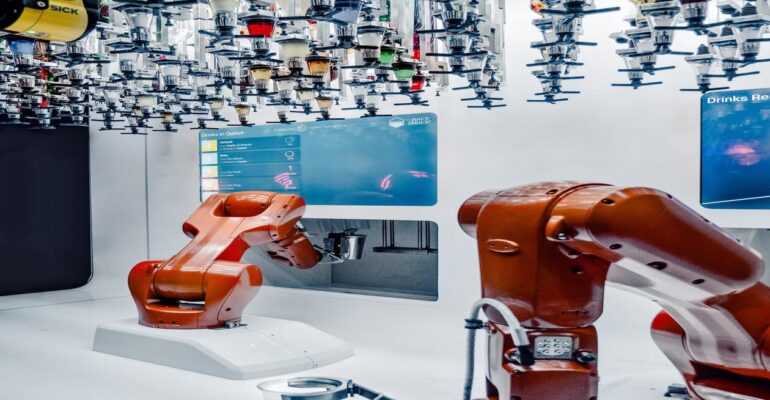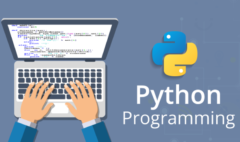MACHINE LEARNING AND ARTIFICIAL INTELLIGENCE – AN INTRODUCTION FOR ABSOLUTE BEGINNERS
March 25, 2022 2022-03-25 16:21MACHINE LEARNING AND ARTIFICIAL INTELLIGENCE – AN INTRODUCTION FOR ABSOLUTE BEGINNERS
MACHINE LEARNING AND ARTIFICIAL INTELLIGENCE – AN INTRODUCTION FOR ABSOLUTE BEGINNERS
The road to the future is paved with Machine Learning and AI-led technologies. Read this blog to know what Machine Learning and Artificial Intelligence are all about…
What Is Artificial Intelligence ?
Artificial Intelligence (AI), also called machine intelligence, is intelligence shown by machines, as opposed to the natural intelligence displayed by humans and other animals. In computer science, AI research is defined as the study of “intelligent agents”: any device that recognizes its environment and takes actions that maximize its chance of successfully achieving its goals. Typically, the term artificial intelligence is used when a machine emulates cognitive functions that humans associate with other human minds, such as learning and problem solving.
In other words, AI is the ability of a computer program or machine to think, learn and make decisions. With AI, computer programs and machines are aiming to do what humans do. These programs and machines are fed a massive amount of data that is then analyzed and processed by the machines that ultimately think logically and perform human actions. AI is particularly helpful when it comes to automating repetitive human tasks.
What Is Machine Learning ?
Machine learning (ML) is a field of artificial intelligence that uses statistical methods to give computer systems the ability to learn (progressively improve performance on a specific task) from data, without being explicitly programmed. The name machine learning was coined in 1959 by computer scientist Arthur Samuel. Machine learning involves the study and building of algorithms that can learn from and make data/ sample-driven predictions. Machine learning is used in a variety of computing tasks where designing and programming explicit algorithms is difficult or not feasible; example applications include email filtering, detection of network intruders, and computer vision.
Machine Learning And Artificial Intelligence : Real Life Analogies And Uses.
To get a better understanding of both these concepts, first let’s take a look at how traditional computer systems work. In traditional computer systems, programmer writes the code for certain input and for that input, there’s a certain expected output. Now if the program comes across an input that it was not programmed for, it is going to show an error and it won’t work. This works well for situations where there’s a structured process. Say for example, in an assembly line, when the package reaches a certain location it needs to be pushed out. Here the programmer can write certain conditions for this to happen and expect the output accordingly.
But in situations where the inputs keep varying and are thus not consistent, it’s traditionally the humans who deliver the output in place of a program. For instance, if one is going to the bank to encash a check. Now we need to keep in mind that several things have been written in a certain person’s handwriting on this check. There’s the name of the person the check is addressed to, the amount and the signature of the person issuing the check. All of this has been written in a handwriting is bound to vary from person to person, so it’s not humanly possible for a programmer to write a program that can read and interpret the handwriting of so many different people across the bank or even the world. So here the only way to detect whether a given check can be encashed or not is to have another human look at the handwriting on the check.
This then is where machine learning (ML) comes in. Machine learning makes machines work the way children would. Suppose there’s a child born in a family. How does this child learn to walk or even talk? The answer is: observation. Indeed, the child mainly learns from observing the people around him / her. A big part of a child’s growth is where the boy / girl is picking up things by imitating the people in his / her surroundings. In addition to this, the kid also evolves over a period of time by learning from his/ her own mistakes.
Machine learning algorithms work in a similar fashion. “These algorithms help machines learn from the data they are provided (collected over a time period) and from their own mistakes. Which is how these machine learning algorithms could actually be used to read checks. Over time, the algorithm can be exposed to different types of handwriting as seen on different checks. It can be thus trained to identify a handwriting and see which checks can in fact be encashed and which should be rejected. Also, it can be trained to the point where if it comes across a never-seen-before handwriting, it would be able to evolve on its own and identify such handwriting as well,” Raina points out.
That’s not all for machine learning can be used in other situations too, such as autonomous driving. Over time, a machine can pick up cognitive functions (think memory, logical thinking, decision-making, sensory functions and executive capabilities) that humans rely on while driving vehicles. In other words, it can learn how humans drive by studying different nuances and the various human reactions (how humans keep the car in the middle of the lane and how they stop the car at a red light and start driving when the light turns green) that have been witnessed during driving.
Moreover, machine learning can also be used in the medical industry to identify radiology results. So if there’s an X-ray image and the task at hand is to diagnose a person’s health condition, the machine could do this task in place of the radiologist. How will this come about? This will come about once the program goes through large amounts of data on human diagnosis of diseases through radiology.
Why Should I Learn Artificial Intelligence
Artificial Intelligence (AI) is changing the way we see the world, not only in technical areas, but across a vast array of industries. Learning and understanding AI, how it works, and what benefits it can have for your business and sector is the first step to a successful career in the future. Completing an online Online course in Artificial Intelligence could be the way to separate you or your business from the crowd and be at the frontier of technological changes in the future. Learn more about our Artificial Intelligence course
5 Reasons Why You Should Learn Artificial Intelligence
1 . Be at the forefront of the future
Humans are getting smarter, and as a result, so is our technology. From machine learning, to algorithms and robotics. Understanding how AI works, but most importantly, how to implement it in your industry and job role, is a crucial step to integrating into the changing technological landscape.
What you learn from one week to the next might adapt due to the ever-changing world of AI, creating such an innovative and exciting learning environment for you.
2 . Enhance your employability
Boosting your technical skills by understanding the world of AI and how it applies to your business and job role, or the career of your dreams, is one of the many reasons to upskill in this field. All of the modules on the course speak directly to the skills that employers are actively seeking within the AI development sector: from Python programming to machine learning to robotics and data science, the course underpins many AI applications to expose you to the most in-demand topics within AI and prepare you to tackle the future.
Learning these new skills that can be applied directly to real-world scenarios will enhance your employability. Not only will you enhance your practical application of AI, but you’ll have a credible Masters qualification totally focused on AI, demonstrating that you see the value of AI for your sector. It also makes you an attractive candidate for developing, managing and planning AI solutions in your role, business or sector.
3 . It is the skill of the century.
e future of work involves automation and as such everyone should know a thing or two about AI. Acquiring such a skill will future-proof your career. The rise of AI in the commercial world will also create many job opportunities in various industries.
4 . AI-related jobs are in demand.
Since AI is in its growth stage currently, pursuing any qualification in this field not only means a decent salary but also bright career prospects. The average salary of a programmer in Malaysia is RM3,000 (source: Glassdoor) and a data scientist earns on average RM6, 866 per month
5 . AI is a versatile field.
The use of AI will eventually affect many facets of human life rather than merely computer and space-related industries. It also plays a significant role in healthcare, finance and even the legal industry. A recent example would be a Malaysian court in Sabah introducing the use of AI in sentencing.








